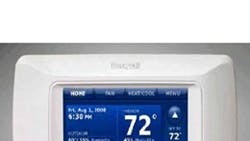Honeywell Adds Smart Grid Application to Prestige Thermostat
Honeywell has added a time-of-use utility price schedule programming capability to the Prestige® programmable thermostat. This new "smart" control enables a homeowner to automate energy consumption based on its actual cost, bringing the benefits of a smart grid into their home.
Like long distance telephone calls, electricity prices during specific times of the day are more expensive than others. Prestige's patented time-of-use price schedule feature is easy-to-use. Based on the homeowner's programming specifications, the Prestige will automatically adjust the home's temperature when prices are at their highest.
"Giving homeowners the tools to interact with utilities and reduce energy use is a critical part of the emerging smart grid," says John Tyhacz, vice president and general manager for Honeywell's home comfort and energy systems business. "Smart controls, such as the Prestige, allow homeowners to automate their energy consumption based on price to better manage their utility costs."
Honeywell introduced the Prestige in late 2008 as the HVAC industry's first full-color, high-definition, wireless-enabled thermostat, Prestige's patented, interview-based interface walks a homeowner through the set-up process by asking a series of questions such as "what time does the first person wake-up in the morning?" or "what time do you go to sleep at night?" The answers help the thermostat program itself – no owner's manual needed.
Its built-in wireless technology allows it to communicate with other Honeywell RedLink™ wireless devices including the Portable Comfort Control, a hand-held device that senses temperature in any room of the house, gives homeowners the control to adjust temperature from anywhere in the house. Prestige is available through an HVAC contractor. When used as directed, Honeywell estimates that homeowner's can cut annual heating and cooling costs by up to 33% – or $200 each year – depending on geographic location.
